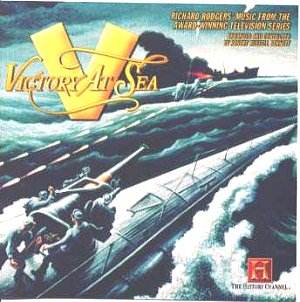| **************************************************************
EDITOR’s RECOMMENDATION November
2000
************************************************************** |
Richard
RODGERS
Victory at Sea
 Robert Russell Bennett
conducting the RCA Symphony Orchestra
Robert Russell Bennett
conducting the RCA Symphony Orchestra
 The History Channel/Q
Records/Atlantic Records 92918-2
[68:36]
The History Channel/Q
Records/Atlantic Records 92918-2
[68:36]
Amazon
USA

The difficulty in categorizing Richard Rodgers' music for Victory at
Sea is a problem of superlatives: Is it the greatest TV score ever written,
the best documentary film score -- or, perhaps, the greatest war music ever
composed? That the score might claim such titles could hardly have been imagined
by anyone involved in the project back in the early 1950s, when the NBC
Television network proposed turning miles of black-and-white, naval news-film
footage into a weekly series on TV, which then was a still-developing medium.
By that time, of course, Rodgers was America's tunesmith, but even he,
reportedly, doubted that he was the right man for this assignment. (After
all, notes the series' co-author Richard Hanser, Oklahoma! is a long way
from Okinawa, and Pal Joey has nothing in common with G.I. Joe!) That Rodgers
accepted, in the end, is due in no small part to the urging of the great
arranger Robert Russell Bennett, who had previously worked with Rodgers on
Broadway and whose contributions to the Victory at Sea score are, arguably,
equal to Rodgers' own. What a team! Rodgers spewing forth melody after melody,
Bennett developing each, in turn, into a symphonic whole that, married with
the film images, created a one of the most memorable and lasting impressions
from TV's early days. So successful was the series, in fact, and so notable
its music, that RCA produced a soundtrack album that, in turn, spawned a
second volume and, finally, a third. Now comes this CD,offered by the History
Channel (a U.S. cable television endeavor devoted, as its name suggests,
to airing documentary material) packing much of those three LPs' punch into
12 cues covering nearly 70 minutes.
Many of the cues are really small suites, highlighting Rodgers' stirring
melodies and hard-charging tempos. Rodgers and Bennett keep the beat moving
at a quick pace throughout most of the score, yet there is much more here
than just the several celebratory marches -- 'Guadalcanal March,' 'Theme
of the Fast Carriers' -- for which it's perhaps best known. My favorite is
'Fire on the Waters,' in which deeply vibrating strings introduce a forbidding
theme to which are added winds in a fugal movement, bringing an added sense
of urgency. (I recall listening to this on the LP as a youth, and imagining
how perfectly it would serve as an overture to a conventional war film score.)
Rodgers utilizes several key themes throughout the score, both suggestive
of undulating ocean waves. The more heroic of the pair is introduced by French
horns in the cue 'Song of the High Seas.' The second theme, frankly, sounds
more like something Rodgers might have penned for a Broadway musical. (In
fact, it became the melody of a hit Perry Como song in the 1950s!) But that
is a small complaint, weighed against the wealth of dramatic, atmospheric
and just plain heart-thumping music with which Rodgers (and Bennett) invested
Victory at Sea. The cue titles alone suggest the range of material: 'The
Pacific Boils Over,' 'Hard Work and Horseplay,' 'D-Day,' 'Song of the High
Seas.' Each is a symphonic depiction of war, sea, and men in battle.
What complaints I have about this CD are reserved for its production. While
I have made reference to various cues, a handful are incorrectly listed on
this recording. I had my suspicions during a first listen, and am grateful
to Douglass Fake of Intrada Records for providing this correct listing:
'Guadalcanal March' is heard under the cue 'Theme of the Fast Carriers,'
while 'Beneath the Southern Cross' is actually heard under the cue 'Fire
on the Waters' which, in turn, is to be heard under the cue 'Rings Around
Rabaul.' (Now, wouldn't you expect The History Channel to get this sort of
thing right?) Finally, I wish the album packagers had seen fit to provide
liner notes offering more than offhand and largely irrelevant personal
observations. This music, and its specific cues, deserve detailed analysis.
John Huether

![]()
![]()
![]()
![]()
![]()
![]()
![]()
![]()
![]()
![]()
![]()
![]()
![]()
![]()
![]()
![]()